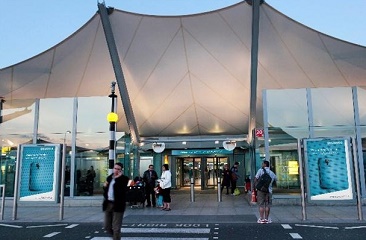With monetary gain as hackers’ primary motivator, cyber attacks are usually perpetrated by cyber criminals and target anything in the virtual realm. Businesses and governments are usually at the center of these raids, while public figures make up the rare instances when an individual falls prey to one as well.
Nonetheless, companies may find themselves in the crossfire of foreign governments attempting to destabilize entire nations or obtain secrets from their geopolitical rivals. With the common motives established, let’s take a deep dive into some of the most notorious cyber attacks in modern history.
1. AWS DDoS Attack: 2020
While the ordinary person might have been more preoccupied with holding down steady employment amidst the tidal waves of layoffs, various companies were also forced to mitigate the virtual spaces of their infrastructure as well. Amazon Web Services (AWS), the cloud computing giant, was hit by a DDoS (denial-of-service) attack in 2020, which affected millions of users worldwide.
While the hackers’ progress into the company’s oyster was slowed down after three days, AWS’s 2020 attack exemplifies the need for proper DDoS detection and protection services for any modern business. The attack’s sheer size, its repercussions for AWS hosting clients’ potential revenue losses and the potential stain it could have on the brand’s reputation are considerable.
2. Marriott Hotels Guest Log Breach: 2014 – 2018
The Marriott Hotel company was fined £18.4 million by the UK’s data protection authority, the Information Commissioners’ Office (ICO), for a significant data breach that may have affected 339 million visitors. Names, passport information, contact information, and credit card information were all compromised, and close to seven million visitor records for persons in the UK were among those exposed.
Another security lapse on Marriott’s side allowed it to happen: the encryption keys were kept on the same server as the credit card details, which were saved in encrypted form. Beginning in 2014, the problem was not uncovered until 2018, which meant that hackers had access to all of Marriott’s guest logs for a total of four years.
3. Uber’s Rider & Driver Data Breach – 2016
Only publicized by the ride-sharing mammoth just six months ago, Uber acknowledged concealing a large data breach that occurred over six years ago. First reported by Bloomberg, the corporation neglected to inform the public and regulatory bodies of a breach that made the private information of 57 million users and drivers public. They even paid the aggressors $100,000 to cover the incident up.
Hackers were able to access and copy a sizable amount of data related to Uber’s users and drivers. These included information on 600,000 driver’s licenses, by using stolen credentials to access a confidential source code repository and acquire a proprietary access key.
4. Sony’s PlayStation Network User Data Breach – 2011
In 2011, Sony disclosed that around 77 million customers’ names, addresses, and other personal information on its Playstation Network had been stolen. The breached data might have included sensitive information regarding children users as well.
To prevent further data breaches, gamer accounts were disabled and locked out of the network for a week. The information, which included names, residences, email addresses, usernames, passwords, security questions, and, in some circumstances, payment details, was accessed by what the console-making giant called an “illegal and unauthorized person”.
Closing Thoughts
From cloud computing giants to videogame behemoths, there is no business, organization, or government that isn’t safe from cyber criminals in modern times. With technological progress in constant motion, today’s businesses need to stay ahead of the curve and prevent hackers from accessing their most sensitive customer information and company documents.







Leave a Reply